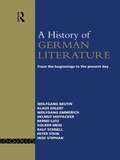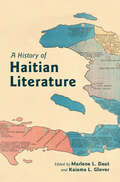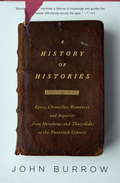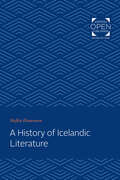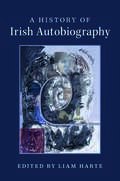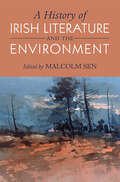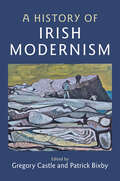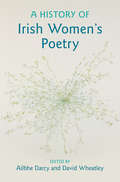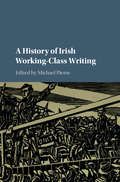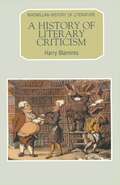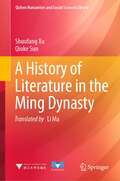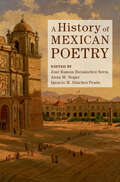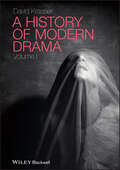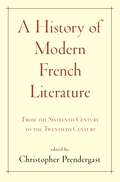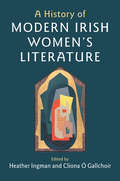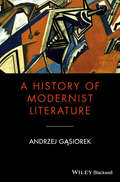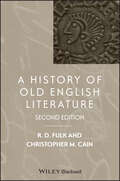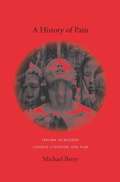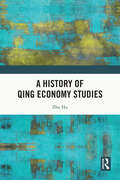- Table View
- List View
A History of German Literature: From the Beginnings to the Present Day
by Peter Stein Volker Meid Bernd Lutz Wolfgang Beutin Klaus Ehlert Wolfgang Emmerich Helmut Hoffacker Ralf Schnell Inge StephanSince the appearance of its first edition in Germany in 1979, A History of German Literature has established itself as a classic work used by students and anyone interested in German literature. The volume chronologically traces the development of German literature from the Middle Ages to the present day. Throughout this chronology, literary developments are set in a social and political context. This includes a final chapter, written for this latest edition, on the consequences of the reunification of Germany in 1990. Thoroughly interdiscipinary in method, the work also reflects recent developments in literary criticism and history. Highly readable and stimulating, A History of German Literature succeeds in making the literature of the past as immediate and engaging as the works of the present. It is both a scholary study and an invaluable reference work for students.
A History of Haitian Literature
by Kaiama L. Glover Marlene L. DautFrom nineteenth-century antislavery pamphleteering to accounts of ecological catastrophe in twenty-first-century fiction, Haitian literature has resounded across the globe since the nation's revolutionaries declared independence in 1804. Starting with pre-revolutionary writing, including the emergence of Haitian Creole letters, extending to the long, largely francophone nineteenth century, and concluding with present-day Haitian writing in the English language, A History of Haitian Literature presents the political, cultural, and historical frameworks necessary to comprehend Haiti's vast literary output. Whether writing in Haiti or its wide-ranging diasporas, Haitian authors have boldly contributed to pressing conversations in global letters while reflecting Haiti's unique cultural and historical experiences. Considering an expansive array of poets, playwrights, and novelists – such as Baron de Vastey, Juste Chanlatte, Demesvar Delorme, Edwidge Danticat, René Depestre, Kettly Mars, Dany Laferrière, and Évelyne Trouillot – the contributors to this volume offer a fresh examination of a richly polyglot, transnational literary tradition that spans more than two centuries.
A History of Histories: Epics, Chronicles, and Inquiries from Herodotus and Thucydides to the Twentieth Century
by J. W. BurrowTreating the practice of history not as an isolated pursuit but as an aspect of human society and an essential part of the culture of the West, John Burrow magnificently brings to life and explains the distinctive qualities found in the work of historians from the ancient Egyptians and Greeks to the present. With a light step and graceful narrative, he gathers together over 2,500 years of the moments and decisions that have helped create Western identity. This unique approach is an incredible lens with which to view the past. Standing alone in its ambition, scale and fascination, Burrow's history of history is certain to stand the test of time.
A History of Icelandic Literature
by Stefán EinarssonOriginally published in 1957. Stefán Einarsson covers almost a thousand years of Icelandic literature in tracing the influence of the sagas and eddic poems. The book begins with background on Icelandic literature, outlining its literary roots in Scandinavia. Following this, Einarsson provides a thorough survey of Icelandic literature through the 1950s.
A History of Indian Poetry in English
by Rosinka ChaudhuriA History of Indian Poetry in English explores the genealogy of Anglophone verse in India from its nineteenth-century origins to the present day. Beginning with an extensive introduction that charts important theoretical contributions to the field, this History includes extensive essays that illuminate the legacy of English in Indian poetry. Organized thematically, these essays survey the multilayered verse of such diverse poets as Henry Louis Vivian Derozio, Rabindranath Tagore, Nissim Ezekiel, Dom Moraes, Kamala Das, and Melanie Silgardo. Written by a host of leading scholars, this History also devotes special attention to the lasting significance of imperialism and diaspora in Indian poetry. This book is of pivotal importance to the development of Indian poetry in English and will serve as an invaluable reference for specialists and students alike.
A History of Irish Autobiography
by Liam HarteA History of Irish Autobiography is the first ever critical survey of autobiographical self-representation in Ireland from its recoverable beginnings to the twenty-first century. The book draws on a wealth of original scholarship by leading experts to provide an authoritative examination of autobiographical writing in the English and Irish languages. Beginning with a comprehensive overview of autobiography theory and criticism in Ireland, the History guides the reader through seventeen centuries of Irish achievement in autobiography, a category that incorporates diverse literary forms, from religious tracts and travelogues to letters, diaries, and online journals. This ambitious book is rich in insight. Chapters are structured around key subgenres, themes, texts, and practitioners, each featuring a guide to recommended further reading. The volume's extensive coverage is complemented by a detailed chronology of Irish autobiography from the fifth century to the contemporary era, the first of its kind to be published. Contains twenty-five chapters by leading scholars from around the world, providing an authoritative critical survey of different types of Irish autobiography, notable subgenres, common themes, and important texts and writers; Includes the first detailed chronology of Irish autobiography from the arrival of Christianity in the fifth century to the contemporary era; Each chapter features a guide to recommended further reading, enabling readers to build upon the concepts provided in each chapter.
A History of Irish Literature and the Environment
by Malcolm SenFrom Gaelic annals and medieval poetry to contemporary Irish literature, A History of Irish Literature and the Environment examines the connections between the Irish environment and Irish literary culture. Themes such as Ireland's island ecology, the ecological history of colonial-era plantation and deforestation, the Great Famine, cultural attitudes towards animals and towards the land, the postcolonial politics of food and energy generation, and the Covid-19 pandemic - this book shows how these factors determine not only a history of the Irish environment but also provide fresh perspectives from which to understand and analyze Irish literature. An international team of contributors provides a comprehensive analysis of Irish literature to show how the literary has always been deeply engaged with environmental questions in Ireland, a crucial new perspective in an age of climate crisis. A History of Irish Literature and the Environment reveals the socio-cultural, racial, and gendered aspects embedded in questions of the Irish environment.
A History of Irish Modernism
by Gregory Castle Patrick BixbyA History of Irish Modernism examines a wide variety of artworks (from the 1890s to the 1970s), including examples from literature, film, painting, music, radio, and architecture. Each chapter considers a particular aspect of Irish culture and reflects on its contribution to modernism at large. In addition to new research on Irish Revival and cultural nationalism, which places them squarely in the modernist arena, chapters offer transnational and transdisciplinary perspectives that place Irish cultural production in new contexts. At the same time, the historical standpoint adopted in each chapter enables our contributors to examine how modernist practices developed across geographical and temporal distances. A History of Irish Modernism thus attests to the unique development of modernism in Ireland—driven by political as well as artistic concerns—even as it embodies aesthetic principles that are the hallmark of modernism in Europe, the Americas and beyond.
A History of Irish Women's Poetry
by David Wheatley Ailbhe DarcyA History of Irish Women's Poetry is a ground-breaking and comprehensive account of Irish women's poetry from earliest times to the present day. It reads Irish women's poetry through many prisms – mythology, gender, history, the nation – and most importantly, close readings of the poetry itself. It covers major figures, such as Máire Mhac an tSaoi, Eavan Boland, Eiléan Ní Chuilleanáin, as well as neglected figures from the past. Writing in both English and Irish is considered, and close attention paid to the many different contexts in which Irish women's poetry has been produced and received, from the anonymous work of the early modern period, through the bardic age, the coterie poets of Anglo-Ireland, the nationalist balladeers of Young Ireland, the Irish Literary Revival, and the advent of modernity. As capacious as it is diverse, this book is an essential contribution to scholarship in the field.
A History of Irish Working-Class Writing
by Michael PierseA History of Irish Working-Class Writing provides a wide-ranging and authoritative chronicle of the writing of Irish working-class experience. Ground-breaking in scholarship and comprehensive in scope, it is a major intervention in Irish Studies scholarship, charting representations of Irish working-class life from eighteenth-century rhymes and songs to the novels, plays and poetry of working-class experience in contemporary Ireland. There are few narrative accounts of Irish radicalism, and even fewer that engage 'history from below'. This book provides original insights in these relatively untilled fields. Exploring workers' experiences in various literary forms, from early to late capitalism, the twenty-two chapters make this book an authoritative and substantial contribution to Irish studies and English literary studies generally.
A History of Literary Criticism
by Michael MoronyThe author traces the course of literary criticism from its foundations in classical and medieval precepts to the theorising of the present day. He explores the texts which have been milestones in the history of critical thought, placing them firmly in the context of their time.
A History of Literature in the Ming Dynasty (Qizhen Humanities and Social Sciences Library)
by Shuofang Xu Qiuke SunThis book explores poems, novels, legends, operas and other genres of writing from the Ming Dynasty. It is composed of two parts: the literary history; and comprehensive reference materials based on the compilation of several chronologies. By studying individual literary works, the book analyzes the basic laws of the development of literature during the Ming Dynasty, and explores the influences of people, time, and place on literature from a sociological perspective. In turn, it conducts a contrastive analysis of Chinese and Western literature, based on similar works from the same literary genre and their creative methods. The book also investigates the relationship between literary theory and literary creation practices, including those used at various poetry schools. In closing, it studies the unique aesthetic traits of related works. Sharing valuable insights and perspectives, the book can serve as a role model for future literary history studies. It offers a unique resource for literary researchers, reference guide for students and educators, and lively read for members of the general public.
A History of Mexican Literature
by Anna M. Nogar Sánchez Prado Ignacio M. Serra José Ramón RuisánchezA History of Mexican Literature chronicles a story more than five hundred years in the making, looking at the development of literary culture in Mexico from its indigenous beginnings to the twenty-first century. Featuring a comprehensive introduction that charts the development of a complex canon, this History includes extensive essays that illuminate the cultural and political intricacies of Mexican literature. Organized thematically, these essays survey the multilayered verse and fiction of such diverse writers as Sor Juana Inés de la Cruz, Mariano Azuela, Xavier Villaurrutia, and Octavio Paz. Written by a host of leading scholars, this History also devotes special attention to the lasting significance of colonialism and multiculturalism in Mexican literature. This book is of pivotal importance to the development of Mexican writing and will serve as an invaluable reference for specialists and students alike.
A History of Mexican Poetry
by Sánchez Prado, Ignacio M. Anna M. Nogar Serra, José Ramón RuisánchezCovering Mexican literary history from pre-Columbian literature to the twenty-first-century, including works from Greater Mexico, this book is the most comprehensive study on Mexican poetry available in English. It examines key authors, such as Bernando de Balbuena, Juana de Asbaje, Ramón López Velarde, José Gorostiza, and Octavio Paz, and considers how they should be read today. Individual chapters focus on important movements, poetic forms, and topics, such as epics, lyric poetry, romanticism, modernism, poetry and performance, poetry in indigenous languages, Mexican American and Chicanx poetry, and the relationship between Mexican literature and gender. This book provides a global understanding of Mexican poetry, its institutions and its main authors for students and scholars in any discipline connected to the subject.
A History of Modern Drama, Volume I: 1960-2000
by David KrasnerCovering the period 1879 to 1959, and taking in everything from Ibsen to Beckett, this book is volume one of a two-part comprehensive examination of the plays, dramatists, and movements that comprise modern world drama. Contains detailed analysis of plays and playwrights, connecting themes and offering original interpretations Includes coverage of non-English works and traditions to create a global view of modern drama Considers the influence of modernism in art, music, literature, architecture, society, and politics on the formation of modern dramatic literature Takes an interpretative and analytical approach to modern dramatic texts rather than focusing on production history Includes coverage of the ways in which staging practices, design concepts, and acting styles informed the construction of the dramas
A History of Modern French Literature: From the Sixteenth Century to the Twentieth Century
by Christopher PrendergastAn accessible and authoritative new history of French literature, written by a highly distinguished transatlantic group of scholarsThis book provides an engaging, accessible, and exciting new history of French literature from the Renaissance through the twentieth century, from Rabelais and Marguerite de Navarre to Samuel Beckett and Assia Djebar. Christopher Prendergast, one of today's most distinguished authorities on French literature, has gathered a transatlantic group of more than thirty leading scholars who provide original essays on carefully selected writers, works, and topics that open a window onto key chapters of French literary history. The book begins in the sixteenth century with the formation of a modern national literary consciousness, and ends in the late twentieth century with the idea of the "national" coming increasingly into question as inherited meanings of "French" and "Frenchness" expand beyond the geographical limits of mainland France.Provides an exciting new account of French literary history from the Renaissance to the end of the twentieth centuryFeatures more than thirty original essays on key writers, works, and topics, written by a distinguished transatlantic group of scholarsIncludes an introduction and indexThe contributors include Etienne Beaulieu, Christopher Braider, Peter Brooks, Mary Ann Caws, David Coward, Nicholas Cronk, Edwin M. Duval, Mary Gallagher, Raymond Geuss, Timothy Hampton, Nicholas Harrison, Katherine Ibbett, Michael Lucey, Susan Maslan, Eric Méchoulan, Hassan Melehy, Larry F. Norman, Nicholas Paige, Roger Pearson, Christopher Prendergast, Jean-Michel Rabaté, Timothy J. Reiss, Sarah Rocheville, Pierre Saint-Amand, Clive Scott, Catriona Seth, Judith Sribnai, Joanna Stalnaker, Aleksandar Stević, Kate E. Tunstall, Steven Ungar, and Wes Williams.
A History of Modern Irish Women's Literature
by Heather Ingman Clíona Ó GallchoirThis book offers the first comprehensive survey of writing by women in Ireland from the seventeenth century to the present day. It covers literature in all genres, including poetry, drama, and fiction, as well as life-writing and unpublished writing, and addresses work in both English and Irish. The chapters are authored by leading experts in their field, giving readers an introduction to cutting edge research on each period and topic. Survey chapters give an essential historical overview, and are complemented by a focus on selected topics such as the short story, and key figures whose relationship to the narrative of Irish literary history is analysed and reconsidered. Demonstrating the pioneering achievements of a huge number of many hitherto neglected writers, A History of Modern Irish Women's Literature makes a critical intervention in Irish literary history.
A History of Modernist Literature (Blackwell History of Literature)
by Andrzej GasiorekA History of Modernist Literature offers a critical overview of modernism in England between the late 1890s and the late 1930s, focusing on the writers, texts, and movements that were especially significant in the development of modernism during these years. A stimulating and coherent account of literary modernism in England which emphasizes the artistic achievements of particular figures and offers detailed readings of key works by the most significant modernist authors whose work transformed early twentieth-century English literary culture Provides in-depth discussion of intellectual debates, the material conditions of literary production and dissemination, and the physical locations in which writers lived and worked The first large-scale book to provide a systematic overview of modernism as it developed in England from the late 1890s through to the late 1930s
A History of Modernist Poetry
by Alex Davis Lee M. Jenkins Davis, Alex and Jenkins, Lee M.A History of Modernist Poetry examines innovative anglophone poetries from decadence to the post-war period. The first of its three parts considers formal and contextual issues, including myth, politics, gender, and race, while the second and third parts discuss a wide range of individual poets, including Ezra Pound, T. S. Eliot, W. B. Yeats, Mina Loy, Gertrude Stein, Wallace Stevens, William Carlos Williams, and Marianne Moore, as well as key movements such as Imagism, Objectivism, and the Harlem Renaissance. This book also addresses the impact of both World Wars on experimental poetries and the crucial role of magazines in disseminating and proselytizing on behalf of poetic modernism. The collection concludes with a wide-ranging discussion of the inheritance of modernism in recent writing on both sides of the Atlantic.
A History of New Zealand Literature
by Mark WilliamsA History of New Zealand Literature traces the genealogy of New Zealand literature from its first imaginings by Europeans in the eighteenth century. Beginning with a comprehensive introduction that charts the growth of, and challenges to, a nationalist literary tradition, the essays in this History illuminate the cultural and political intricacies of New Zealand literature, surveying the multilayered verse, fiction and drama of such diverse writers as Katherine Mansfield, Allen Curnow, Frank Sargeson, Janet Frame, Keri Hulme, Witi Ihimaera and Patricia Grace. Written by a host of leading scholars, this History devotes special attention to the lasting significance of colonialism, biculturalism and multiculturalism in New Zealand literature. A History of New Zealand Literature is of pivotal importance to the development of New Zealand writing and will serve as an invaluable reference for specialists and students alike.
A History of Old English Literature
by Robert D. Fulk Christopher M. CainThis revised edition of A History of Old English Literature draws extensively on the latest scholarship to have evolved over the last decade. The text incorporates additional material throughout, including two new chapters on Anglo-Saxon manuscripts and incidental and marginal texts.This revised edition responds to the renewed historicism in medieval studiesProvides wide-ranging coverage, including Anglo-Latin literature as well as non-canonical writingsIncludes new chapters on manuscripts and on marginal and incidental textsIncorporates expanded coverage of legal texts and scientific and scholastic texts, now treated in separate chaptersDemonstrates that the field of Anglo-Saxon studies is uniquely placed to contribute to current literary debates
A History of Pain
by Michael BerryThe portrayal of historical atrocity in fiction, film, and popular culture can reveal much about the function of individual memory and the shifting status of national identity. In the context of Chinese culture, films such as Hou Hsiao-hsien's City of Sadness and Lou Ye's Summer Palace and novels such as Ye Zhaoyan's Nanjing 1937: A Love Story and Wang Xiaobo's The Golden Age collectively reimagine past horrors and give rise to new historical narratives.Michael Berry takes an innovative look at the representation of six specific historical traumas in modern Chinese history: the Musha Incident (1930); the Rape of Nanjing (1937-38); the February 28 Incident (1947); the Cultural Revolution (1966-76); Tiananmen Square (1989); and the Handover of Hong Kong (1997). He identifies two primary modes of restaging historical violence: centripetal trauma, or violence inflicted from the outside that inspires a reexamination of the Chinese nation, and centrifugal trauma, which, originating from within, inspires traumatic narratives that are projected out onto a transnational vision of global dreams and, sometimes, nightmares.These modes allow Berry to connect portrayals of mass violence to ideas of modernity and the nation. He also illuminates the relationship between historical atrocity on a national scale and the pain experienced by the individual; the function of film and literature as historical testimony; the intersection between politics and art, history and memory; and the particular advantages of modern media, which have found new means of narrating the burden of historical violence.As Chinese artists began to probe previously taboo aspects of their nation's history in the final decades of the twentieth century, they created texts that prefigured, echoed, or subverted social, political, and cultural trends. A History of Pain acknowledges the far-reaching influence of this art and addresses its profound role in shaping the public imagination and conception-as well as misconception-of modern Chinese history.
A History of Pain: Trauma in Modern Chinese Literature and Film (Global Chinese Culture)
by Michael BerryThe portrayal of historical atrocity in fiction, film, and popular culture can reveal much about the function of individual memory and the shifting status of national identity. In the context of Chinese culture, films such as Hou Hsiao-hsien's City of Sadness and Lou Ye's Summer Palace and novels such as Ye Zhaoyan's Nanjing 1937: A Love Story and Wang Xiaobo's The Golden Age collectively reimagine past horrors and give rise to new historical narratives.Michael Berry takes an innovative look at the representation of six specific historical traumas in modern Chinese history: the Musha Incident (1930); the Rape of Nanjing (1937-38); the February 28 Incident (1947); the Cultural Revolution (1966-76); Tiananmen Square (1989); and the Handover of Hong Kong (1997). He identifies two primary modes of restaging historical violence: centripetal trauma, or violence inflicted from the outside that inspires a reexamination of the Chinese nation, and centrifugal trauma, which, originating from within, inspires traumatic narratives that are projected out onto a transnational vision of global dreams and, sometimes, nightmares. These modes allow Berry to connect portrayals of mass violence to ideas of modernity and the nation. He also illuminates the relationship between historical atrocity on a national scale and the pain experienced by the individual; the function of film and literature as historical testimony; the intersection between politics and art, history and memory; and the particular advantages of modern media, which have found new means of narrating the burden of historical violence. As Chinese artists began to probe previously taboo aspects of their nation's history in the final decades of the twentieth century, they created texts that prefigured, echoed, or subverted social, political, and cultural trends. A History of Pain acknowledges the far-reaching influence of this art and addresses its profound role in shaping the public imagination and conception-as well as misconception-of modern Chinese history.
A History of Political Science (Elements in Historical Theory and Practice)
by Mark BevirThis Element denaturalises political science, stressing the contestability and contingency of ideas, traditions, subfields, and even the discipline itself. The history of political science is less one of scholars testing and improving theories by reference to data than of their appropriating and transforming ideas, often obscuring or obliterating former meanings, to serve new purposes in shifting political contexts. Political science arose in the late nineteenth century as part of a wider modernism that replaced earlier developmental narratives with more formal explanations. It changed as some scholars yoked together behavioural topics, quantitative techniques, and positivist theory, and as other scholars rejected their doing so. Subfields such as International Relations remained semi-detached and focused on policy as much as theory. Furthermore, the shifting fashions within political science – modernism, behaviouralism, realism, neoliberalism, the new institutionalism – have informed the policies by which governments have tried to tame contingency and govern people.
A History of Qing Economy Studies
by Zhu HuThis book is a historiographical study of the economic history of the Qing dynasty that systematically examines the research paradigms underlying the range of historical studies conducted over the past century. In reviewing historical studies of the economic history of the Qing dynasty from an epistemological and methodological perspective, the book explores how this research area emerged and developed and explores the three major paradigms that dominate the field: the revolutionary historical paradigm based on productive relations; the modernization paradigm centring on productivity and the Chinese-centric approach that seeks to understand the internal momentum of economic development. It is shown that shifts in paradigms derive not only from the linear derivation of academic ideas but are also closely related to wider changes in society and social discourse. Hence, the author proposes an approach that studies economic and social history with an emphasis on social practice, shedding light on a better understanding of the direction of China’s economic history. The title will benefit scholars and students interested in economic history and modern Chinese history.
